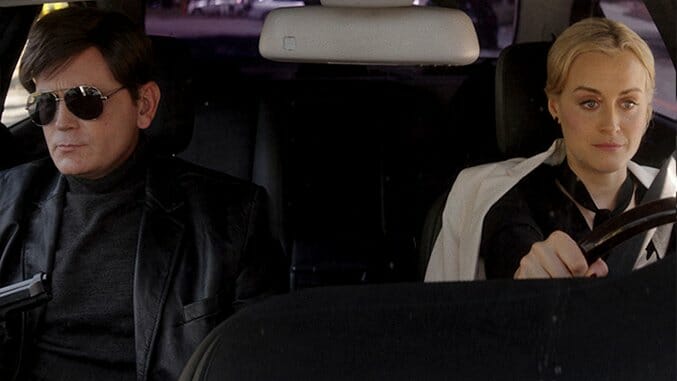Take Me

Pat Healy is a sick, sick bastard. Look, it takes all kinds, but odds are that he doesn’t need to go through his career playing characters fated to have abuse heaped on them, whether at their own invitation or for the twisted pleasures of others. (See: 2014’s excellent and deranged black comic delight, Cheap Thrills.) He could probably take roles in movies and television series that don’t require him to have injuries both physical and mental inflicted upon his person. But where would that leave the rest of us? We’re all culpable in the encouragement of his fascination with self-brutalization, but the man has a gift for it, so who are we to question his proclivities? It’s not like he’s bad at getting his ass beat on screen or anything, after all. He’s great at it.
As if to drive that point home, here’s Take Me, Healy’s latest endeavor. He directed the thing, thus marking his first time making a movie, and also serves as its nominal star, though in truth he’s outshined by co-lead Taylor Schilling, known best for her work on Orange is the New Black, and perhaps for 2015’s sex comedy The Overnight, too. Healy is terrific, as Healy usually is, but by crafting Take Me pretty much solely around himself and Schilling, he creates a series of opportunities for Schilling to make an impression. Healy’s good; Schilling’s superb. Together, they make a hell of a team, he the wide-eyed schlemiel, she the hysterical but thoroughly capable victim who would naturally rather not be a victim in the first place.
Healy plays Ray, the type of misguided entrepreneur who could only be spawned from the loins of America. He runs a business that orchestrates highly realistic simulated kidnapping scenarios for its client, developed, in Ray’s words, using “nuanced psychotherapeutic techniques.” His idea of subtlety is about as delicate as a hammer to the balls: During Take Me’s opening credit sequence, he snatches one of his customers, Stuart (Jim O’Heir), whisks him away to a dank old basement, straps him to a chair and force-feeds him a bag full of greasy fast food as a deterrent to Stuart’s horrible eating habits. It isn’t pretty, but apparently Ray’s methods work, at least if we take his Polaroid wall of jobs well done at face value. But then Ray gets a call from Anna St. Blair (Schilling), who promises him a sizeable payday so long as he agrees to bend, or possibly break, a few of his cardinal rules, such as “no slapping.” Ray can’t say no. He needs the money.
All goes downhill for poor Ray from there, but uphill for us. Healy handles bodily harm with a morbid, compulsively watchable artistry, a Mick Foley for the big screen if ever there was one: It seems unlikely that there’s anything he won’t do for a laugh, including, but not limited to, taking two pellet gun shots right to the chest, swallowing a key fob, or getting smacked upside the head with a fire poker. But gifted as he is at absorbing trauma, he’s nearly matched by Schilling, who spends big stretches of the film bound in one fashion or another and on the receiving end of all manner of verbal maltreatment. They’re a stand-up duo demonstrating the finer merits of doing unto others as you would have others do unto you, habitually reversing roles in their dynamic as kidnapper/mark throughout Take Me’s 80 minute running time, often within the same scene. Ray has all the power, sure, but let’s face it: He never really has all the power.
-

-

-

-

-

-

-

-

-

-

-

-

-

-

-

-

-

-

-

-

-

-

-

-

-

-

-

-

-

-

-

-

-

-

-

-

-

-

-

-








































